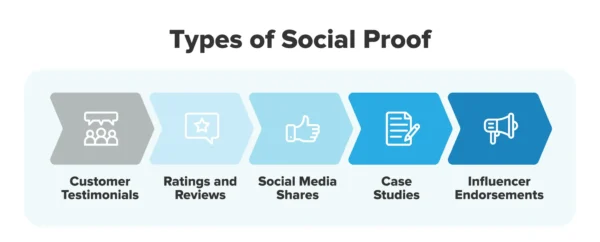Your company’s credibility isn’t just an asset… it’s the deciding factor. The fastest-growing B2B brands aren’t louder; they’re more trusted.
That trust is built through Social Proof Marketing—the strategic use of third-party validation to remove buyer doubt, reduce risk, and accelerate decisions.
Does your sales process have the credibility buyers trust? Take the Social Proof to Sales Diagnostic Quiz to find out.
When executed right, it transforms how decision-makers perceive your value… turning hesitation into high-quality leads and confidence into conversions.
Why is social proof so effective? It taps into our natural tendency to trust the choices of others, especially in high-stakes decisions. As noted by The Decision Lab, social proof builds confidence and trust — vital in B2B settings where purchases involve multiple stakeholders and longer sales cycles. In short, Marketing for Social Proof makes your value feel both credible and safe.

Understanding Social Proof Marketing in B2B
Social proof manifests in various forms — video endorsements, written testimonials or reviews, client logos, case studies, industry recognition, articles, etc. See real examples. Marketing for Social Proof turns these assets into persuasive proof points that establish credibility. In B2B marketing, a testimonial from a respected industry leader or a data-rich case study can be particularly persuasive.
B2B marketing presents unique challenges, including complex buying processes and extended decision timelines. To influence decisions effectively, social proof must be both credible and relevant to the buyer’s industry, role, and pain points.
High-growth companies provide excellent examples of implementing social proof. For instance, Yesware demonstrates how businesses creatively use social proof to drive growth and build trust with potential clients—an approach central to Marketing for Social Proof.
Effective Types of Social Proof for B2B
Within social proof marketing, you can leverage multiple formats, each building trust and credibility in different ways:
- Expert Endorsements: Validation from industry experts or thought leaders can elevate your authority and reduce perceived risk for buyers.
- User Reviews: Genuine client feedback and experiences are powerful. Prospects seek honest reviews as indicators of satisfaction, reliability, and outcomes.
- Influencer Partnerships: Collaborating with industry influencers can expand reach and credibility among your target audience. For more insights, explore influencer marketing statistics on Statista.
Each type of social proof can elevate your Marketing for Social Proof strategy, helping convert qualified leads into loyal clients.

Building Trust with Social Proof Content
Creating content that builds trust takes intention. Here’s how to craft Marketing for Social Proof content that connects and converts:
- Gathering Testimonials + Endorsements: Ask satisfied clients for specific, outcome-focused feedback—metrics, timelines, and the “before vs. after” story of how your product or service solved their problem. Better yet, have a quick interview Q&A session to capture their feedback.
- Presenting Case Studies: Develop detailed case studies with measurable outcomes, clear use cases, and executive quotes. Make them scannable and data-forward.
- Ensuring Authenticity and Transparency: Use real names, titles, and data where possible. Transparency about your process and results builds durable trust.
When Marketing for Social Proof is done well, your content attracts qualified prospects and reinforces your brand’s reliability at every step of the buyer journey.
Leveraging Social Proof in Digital Marketing Strategies
Integrating Marketing for Social Proof into your digital strategy can lift engagement and sales velocity. Here’s how to maximize it across channels:
- Website: Feature testimonials, case studies, and client logos prominently on high-intent pages (home, solutions, pricing) to provide real-world proof where decisions happen.
- Social Media: Share user-generated content, reviews, and success stories on platforms like LinkedIn and Twitter to boost credibility and spark conversation.
- Email Campaigns: Include short testimonials or mini-case studies in newsletters and nurture sequences to reinforce your value proposition and improve click-through rates.
To optimize your social proof, consider these strategies:
- Regularly update content so your proof reflects current products, markets, and results.
- Encourage satisfied clients to leave reviews and share their experiences publicly.
- Focus on the proof formats that resonate most with your ideal audience and sales stage.
Measuring the Impact of Social Proof on B2B Leads
To ensure your Marketing for Social Proof efforts perform, measure their impact on lead generation and pipeline. Key metrics and tools include:
- Conversion Rates: Compare conversion rates on pages or campaigns featuring social proof versus those without to understand direct impact.
- Engagement Metrics: Track likes, shares, comments, and time on page for content with social proof to gauge perceived value.
- Customer Feedback: Use surveys or direct feedback to learn how proof influenced decision-making and which formats resonate.
- Analytics Tools: Utilize tools like Google Analytics to analyze behavior flows and identify which proof elements drive action.
By analyzing this data, you can double down on what works, refine weaker areas, and continuously improve lead quality and conversion rates.

Real-World Examples of Social Proof Success
Marketing for Social Proof can be transformative in B2B. Many companies have successfully used it to boost leads and conversions. Here are common approaches:
- Case Studies: Companies use detailed case studies to highlight success stories, demonstrating expertise and building trust. For example, a tech firm might showcase how their software improved a client’s efficiency by 30%.
- Testimonials: Genuine testimonials from satisfied customers can influence potential buyers. A consulting firm may feature client testimonials emphasizing their strategies’ positive impact.
- Industry Recognition: Awards and recognitions serve as powerful social proof, validating authority and competence.
- High-Profile Partnerships: Collaborating with well-known brands or influencers can enhance credibility, such as a staffing agency partnering with a leading HR expert for webinars.
Yesware. points to a valid point. “Social Proof” is not a new term. Dr. Robert Cialdini coined the term social proof back in 1984 with his book “Influence.” Here, he develops the six principles of persuasion:
Maximizing ROI with Social Proof
Maximizing ROI from Marketing for Social Proof is crucial for B2B companies. Align your proof with the moments that matter most in the buyer journey and tie it to clear goals:
- Align with Marketing Goals: Ensure social proof efforts support overall marketing objectives—awareness, lead gen, or sales enablement—to stay focused and drive outcomes.
- Utilize Proven Content’s Services: Leverage services like blog writing, social media content, and consulting to enhance your strategy. Proven Content offers tailored strategies to boost marketing efforts.
- Implement the ROI-Recapture Method: Proven Content’s unique “ROI-Recapture” method optimizes marketing spend for maximum impact.
- Monitor and Adjust: Regularly measure the impact of social proof initiatives and adjust strategies as needed for effectiveness.
By integrating these strategies, you can ensure your Marketing for Social Proof enhances credibility and drives measurable business outcomes. For expert guidance, reach out to Proven Content for an actionable conversation. You can go it alone, or rely on marketing expert help.
Not ready to talk? Simply find out if your sales process has the credibility buyers trust. Take the Social Proof to Sales Diagnostic Quiz to find out in less than 1 minute.





